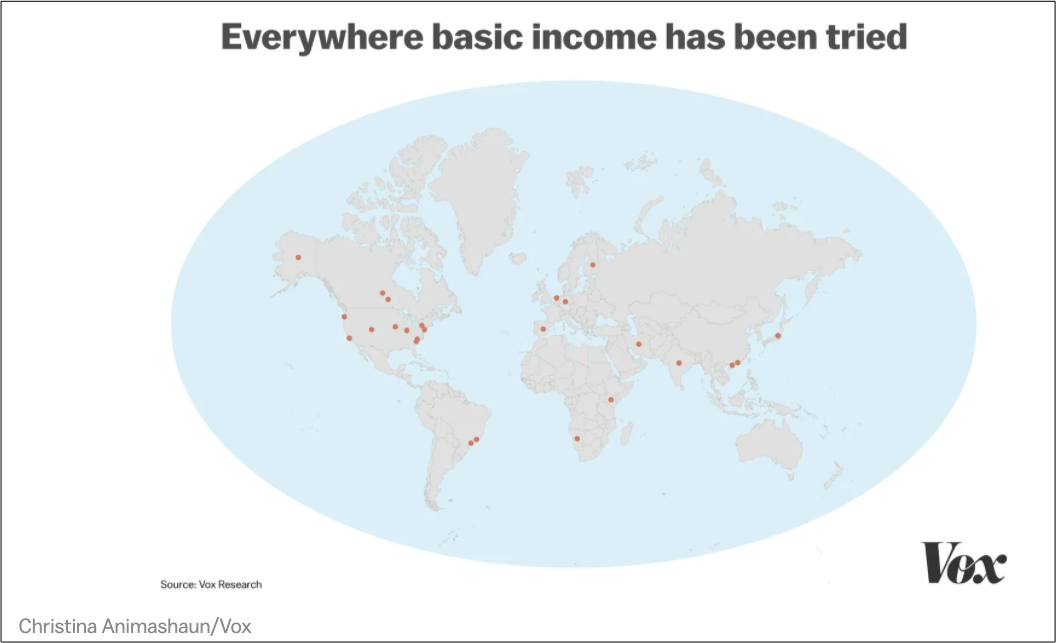
Why France Liked California Wine
December 18, 2023
Selling U.S. Steel for the Second Time
December 20, 2023In a 2020 survey, Pew gave us some insight about a Universal Basic Income (UBI) that has no strings attached. Your approval or opposition depends on politics, age, race, and income.
Instead, it should relate to how well UBI programs have fared.
A Universal Basic Income
The Pew Survey concluded that Republicans are less likely than Democrats to approve of UBI initiatives. Also predictably, younger people have a more favorable opinion as do Blacks, Hispanics, and lower income households. Overall though, 54 percent were against the UBI:

Correspondingly, in 2016, Swiss voters said no. Three years later, a UBI experiment in Finland received a mediocre grade for incentivizing employment. And, in Canada, a 525-page report concluded that targeted giving covering rent or dental care made more sense
Existing programs
The UBI story is an old one. In 1797, Thomas Paine (yes, the Common Sense Thomas Paine) said that adults had the right to a basic income. Leaping to the 1930s, Louisiana Governor Huey Long proposed a $2,000 to $3,000 basic income (equal to 47,000-$71,000 today). We also had a $1,000 check to everyone in the 1972 McGovern platform while 2020 presidential candidate Andrew Yang proposed a UBI.
We posted this map in October, 2021:

US Cities
Including Durham, North Carolina, Gainesville, Florida, and Birmingham Alabama, a slew of U.S. cities have had UBI programs that are supported by affluent donors and municipal funding, Through the Durham initiative, $600 a month made it possible for a single, formerly incarcerated, mother of three to buy a 2000 Nissan and drive to work. In Denver, people received up to $1,000 a month.
Give Directly
The people that run Give Directly support their approach by citing the money they save. After all, they are not training anyone to do a job. They are not paying for the bureaucracy that provides specific services. Instead, the recipients decided how to use their money. Furthermore, it’s tough to guarantee a job or literacy. Instead, in Rwanda a control group got $3 million for a nutrition program and another group got the $3 million directly. The cash group fared better because households used the money for cows and milk. By contrast, the nutrition program spent money on education with no money for the milk.
The experience of Give Directly contradicts the dictum to give someone a fishing rod rather than fish. You should give neither–just the money.
Our Bottom Line: Redistribution
In Equality and Efficiency The Big Tradeoff, economist Arthur Okun explained the tension between capitalism and democracy. Similarly, Nobel laureate Angus Deaton told us that when an economy grows, so too will inequality. However, if we want to reduce the inequality, one solution is redistribution through government taxation and programs that shift wealth from the group that is more affluent to those that have less.
One redistribution method is the universal basic income.
With wealth moving from those who have it to others that need more, redistribution moves money. When Jack Dorsey, former Twitter CEO, pledged $15 million to Mayors for a Guaranteed Income, he was redistributing his income. Durham was one of 25 municipalities getting a $500,000 slice of the Dorsey money.
But where have we wound up? While the UBI seems to lose in referendums, it has been reasonably successful.
My sources and more: Several weeks ago, Slate Money focused on unconditional cash gifts. From there, the research possibilities multiplied. Pew had a survey, NPR had an interview, and Business Insider had an update, As for the Finnish experiment, the VATT Institute took a look while Canada was the focus of this article. And finally, at econlife, we looked at Stockton California’s program.
![econlifelogotrademarkedwebsitelogo[1]](/wp-content/uploads/2024/05/econlifelogotrademarkedwebsitelogo1.png#100878)




